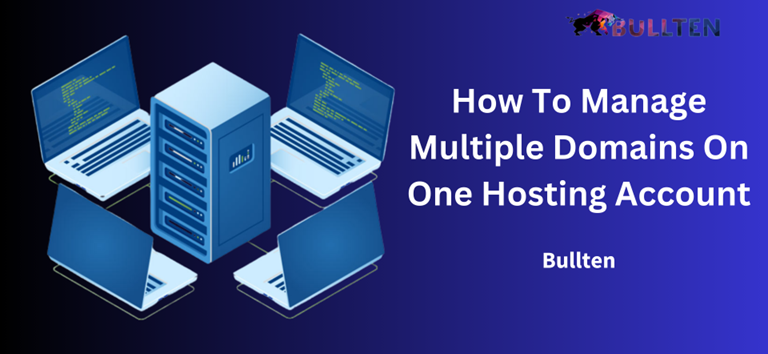Introduction:
Are you juggling multiple websites and struggling to keep them all in check? It may seem difficult to manage several domains on one hosting account, but with the appropriate techniques, it can be simple. Bullten’s tutorial will show you how to manage several domains effectively on a single hosting account. These pointers can help you organize your site management efforts and save time and money whether you’re a business owner, web developer, or digital entrepreneur.
Understanding hosting accounts
Before we dive into the nitty-gritty of domain management, let’s clarify what hosting accounts are and why hosting multiple domains on one account can be beneficial.
Different types of hosting
Among the many hosting options, shared, VPS (virtual private server), and dedicated hosting are just a handful. Each has benefits and drawbacks. We’ll examine which one suits you the most while managing several domains.
Benefits of hosting multiple domains
Learn about the benefits, including cost savings, centralized management, and scalability, of hosting several domains on a single account.
Selecting the best hosting company
How easily you can handle several domains depends significantly on the fully managed web hosting company you choose. Discover the elements to take into account when choosing a hosting company that supports your domain administration objectives.
Registering and adding domains
Getting a domain and adding it to your hosting account is the starting point. We’ll guide you through the domain registration process and explain how to add domains to your hosting account.
Configuring DNS settings
Understanding DNS (domain name system) settings is crucial for proper domain management. We’ll break down DNS basics and show you how to update DNS records for your domains.
Creating subdomains
Subdomains are an effective tool for structuring your material. Learn what subdomains are and how to configure each of your domains using them effectively.
Managing website files
Keeping your website files organized is essential when you have multiple domains. Learn the best practices for file management, including using FTP (file transfer protocol).
Handling email accounts
Setting up and managing email accounts associated with your domains is vital for communication. We’ll explain how to create and manage email addresses for each domain.
Security considerations
Security should never be overlooked when managing multiple domains. Explore the importance of SSL Certificates and how to protect all your domains effectively.
Monitoring and analytics
Tracking the performance of your websites is key to success. Discover the tools available for monitoring and analyzing data for multiple domains.
Scaling your hosting
Your hosting plan may need to be upgraded as your online presence expands. Learn how to add new domains to your hosting account and when it’s time to scale up.
Troubleshooting common issues
Issues can arise when managing multiple domains. We’ll help you identify and resolve common problems and when it’s best to seek professional assistance.
Tips for efficient management
Time-saving strategies and best practices for efficiently managing multiple domains will help you stay organized and productive.
Staying updated
The technology landscape is ever-changing. Stay informed about updates and changes that may affect your domains’ security and performance.
Conclusion
A skill that can help you save time, money, and frustration is effectively managing many domains on a single hosting account. You can simplify your domain management procedure and concentrate on expanding your internet presence by adhering to the guidelines and suggestions provided in this manual.
FAQs (frequently asked questions)
1. Can I host many domains on a shared server?
Yes, you can utilize shared hosting for several domains, but it’s crucial to pick a plan that supports this and has enough resources to handle them.
2. Does each domain require its own SSL certificate?
Yes, in order to maintain safe connections, it is advised to have a unique SSL certificate for each domain. Numerous hosting companies provide possibilities for numerous SSL certificates.
3. When should I consider upgrading my hosting plan?
Consider upgrading your hosting plan when your websites experience increased traffic, slower load times, or resource limitations. Evaluate your hosting needs regularly to ensure optimal performance.
